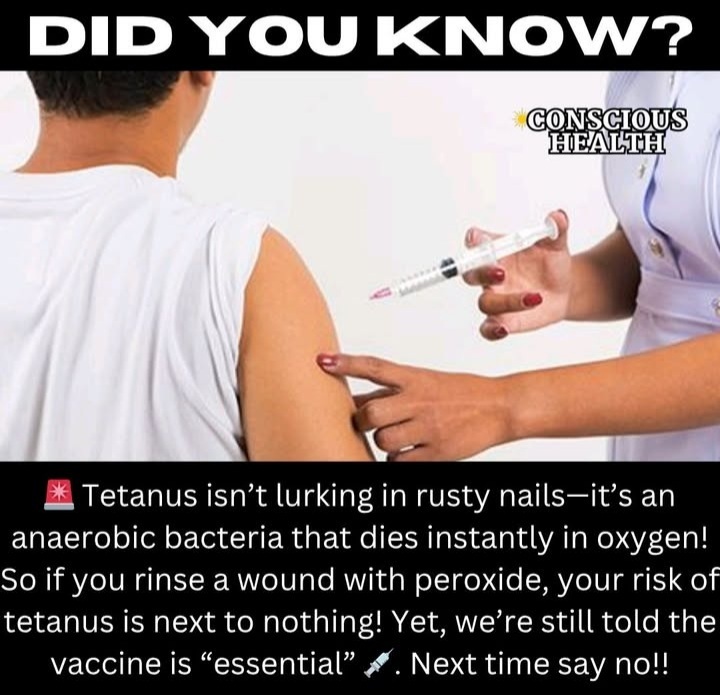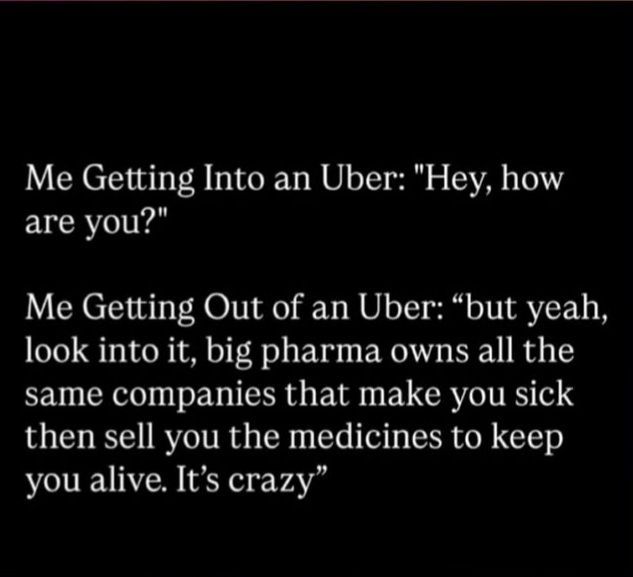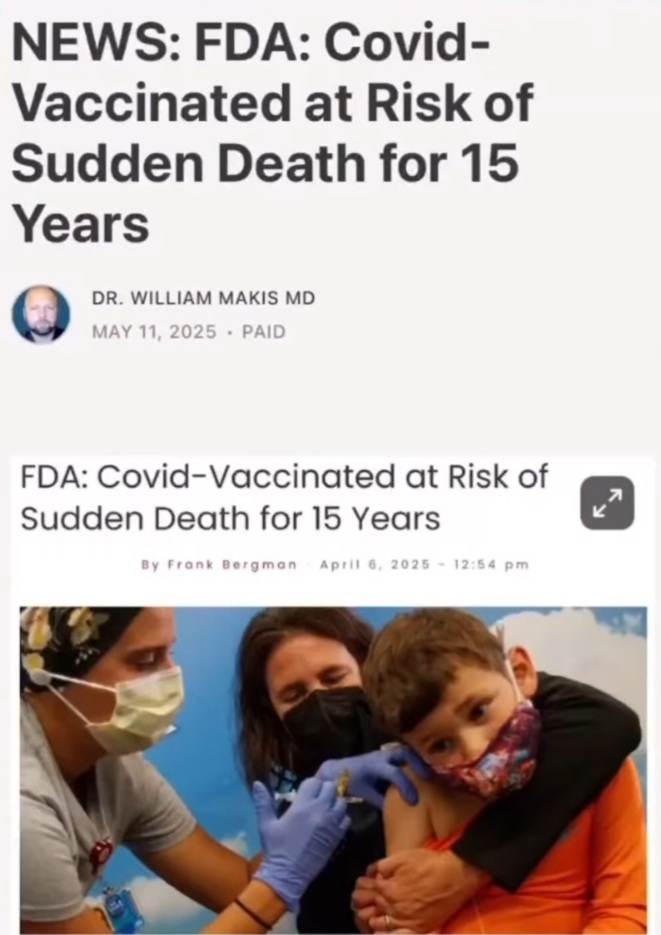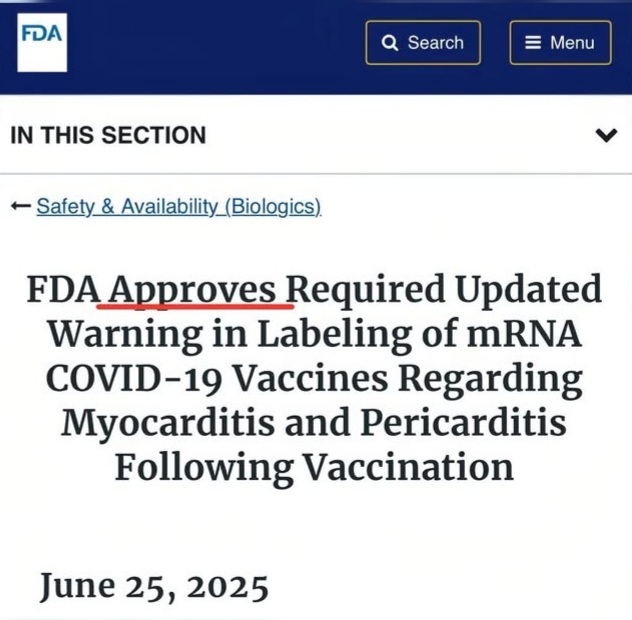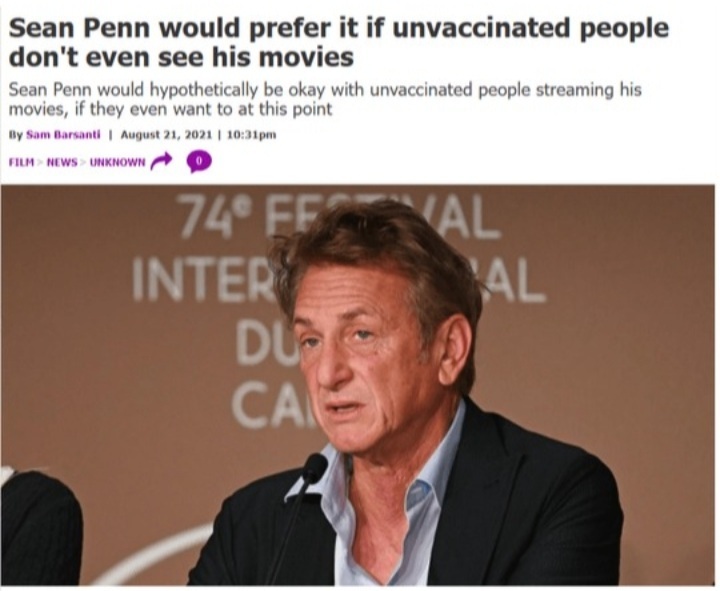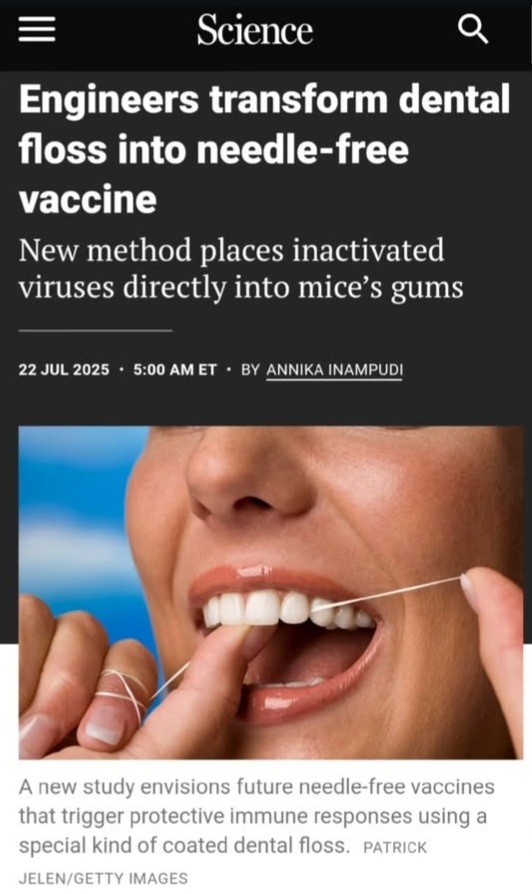You are using an out of date browser. It may not display this or other websites correctly.
You should upgrade or use an alternative browser.
You should upgrade or use an alternative browser.
Vaccine is bad juju
- Thread starter Blazor
- Start date
Lily
Site Supporter
- Reaction score
- 23,673
- Location
- California
Trump administration cancels contract with Moderna for development of Flu Vaccine due to its use of mRNA technology:
Bobby Medium Rare F Kennedy, Jr is a tool.
Lily
Site Supporter
- Reaction score
- 23,673
- Location
- California
I heard a distinct "swoosh" days later...I hope he took his tutu with him.
- Reaction score
- 10,211
- Reaction score
- 10,211
- Reaction score
- 10,211
- Reaction score
- 10,211
Lily
Site Supporter
- Reaction score
- 23,673
- Location
- California
- Reaction score
- 10,211
Joe
Site Supporter
- Reaction score
- 4,214
What a funny fantasy...lol

Odd is all those female Bidders in that picture have the same face too.
- Reaction score
- 10,211
The Prowler
Site Supporter
- Reaction score
- 4,535
- Location
- Canada
"Information about myocarditis (inflammation of the heart muscle) and pericarditis (inflammation of the lining outside the heart) following vaccination with these mRNA COVID-19 vaccines has been included in the labeling since 2021."
- Reaction score
- -653
- Location
- Concealed Within Each Of You
And those of us who opted out of this experiment got shat on for it.
- Reaction score
- 986
- Location
- the Ether
LoLz at you nervous nelly alarmists.
mRNA COVID-19 vaccines have been associated with a small increase in the risk of myocarditis and pericarditis, particularly in male adolescents and young adults. This risk is rare and significantly lower than the risk of heart inflammation associated with COVID-19 infection itself.
Here's what the data suggest:
mRNA COVID-19 vaccines have been associated with a small increase in the risk of myocarditis and pericarditis, particularly in male adolescents and young adults. This risk is rare and significantly lower than the risk of heart inflammation associated with COVID-19 infection itself.
Here's what the data suggest:
- Risk is highest in young men: Myocarditis after mRNA vaccination is most commonly observed in adolescent and young adult males, particularly within 7 days of the second dose. Studies have shown reporting rates peaking in males aged 12-17 years.
- Specific vaccine and dose: Among the mRNA vaccines, the Moderna vaccine (mRNA-1273) has been associated with a higher risk of myocarditis compared to the Pfizer-BioNTech vaccine (BNT162b2) in young males. The risk is higher after the second dose than the first, and lower still after booster doses. However, some sources indicate that the risk after a booster dose remains elevated but is lower than after the second dose.
- Lower risk than COVID-19 infection: The risk of myocarditis after COVID-19 infection is significantly greater than the risk associated with vaccination. For example, one study found that COVID-19 infection was associated with an 11-fold increased risk of myocarditis in unvaccinated individuals, compared to a lower risk after vaccination.
- Mostly mild cases and favorable outcomes: Most cases of myocarditis associated with vaccination are reported to be mild, transient, and self-limiting. Patients usually recover quickly with rest and medications.
- Persistence of imaging findings: While most patients recover clinically, studies have shown that a high percentage of individuals who developed vaccine-associated myocarditis still show signs of myocardial injury on cardiac MRI scans months later. The long-term clinical and prognostic significance of these findings is currently unknown.
- The benefits of COVID-19 vaccination in preventing severe illness, hospitalization, and death from COVID-19 far outweigh the rare risk of myocarditis and pericarditis associated with the vaccine.
- Reaction score
- -653
- Location
- Concealed Within Each Of You
- Reaction score
- 3,106
- Location
- Chicagoland
You get a new jab everytime your betters tell you to, don't you Holli?LoLz at you nervous nelly alarmists.
mRNA COVID-19 vaccines have been associated with a small increase in the risk of myocarditis and pericarditis, particularly in male adolescents and young adults. This risk is rare and significantly lower than the risk of heart inflammation associated with COVID-19 infection itself.
Here's what the data suggest:
Important considerations:
- Risk is highest in young men: Myocarditis after mRNA vaccination is most commonly observed in adolescent and young adult males, particularly within 7 days of the second dose. Studies have shown reporting rates peaking in males aged 12-17 years.
- Specific vaccine and dose: Among the mRNA vaccines, the Moderna vaccine (mRNA-1273) has been associated with a higher risk of myocarditis compared to the Pfizer-BioNTech vaccine (BNT162b2) in young males. The risk is higher after the second dose than the first, and lower still after booster doses. However, some sources indicate that the risk after a booster dose remains elevated but is lower than after the second dose.
- Lower risk than COVID-19 infection: The risk of myocarditis after COVID-19 infection is significantly greater than the risk associated with vaccination. For example, one study found that COVID-19 infection was associated with an 11-fold increased risk of myocarditis in unvaccinated individuals, compared to a lower risk after vaccination.
- Mostly mild cases and favorable outcomes: Most cases of myocarditis associated with vaccination are reported to be mild, transient, and self-limiting. Patients usually recover quickly with rest and medications.
- Persistence of imaging findings: While most patients recover clinically, studies have shown that a high percentage of individuals who developed vaccine-associated myocarditis still show signs of myocardial injury on cardiac MRI scans months later. The long-term clinical and prognostic significance of these findings is currently unknown.
- The benefits of COVID-19 vaccination in preventing severe illness, hospitalization, and death from COVID-19 far outweigh the rare risk of myocarditis and pericarditis associated with the vaccine.
- Reaction score
- -653
- Location
- Concealed Within Each Of You
"Fuck you, just do what they tell you!" -Rage For The MachineYou get a new jab everytime your betters tell you to, don't you Holli?
- Reaction score
- 21,731
- Location
- PNW Regional Antifa V.P.
Bastard Factory is very fortunate to have a tiny handful of internet knuckleheads that know waay more about virology and immunization than the scientists who have studied such things for decades.
#Blessed
#Blessed
Lily
Site Supporter
- Reaction score
- 23,673
- Location
- California
LoLz at you nervous nelly alarmists.
mRNA COVID-19 vaccines have been associated with a small increase in the risk of myocarditis and pericarditis, particularly in male adolescents and young adults. This risk is rare and significantly lower than the risk of heart inflammation associated with COVID-19 infection itself.
Here's what the data suggest:
Important considerations:
- Risk is highest in young men: Myocarditis after mRNA vaccination is most commonly observed in adolescent and young adult males, particularly within 7 days of the second dose. Studies have shown reporting rates peaking in males aged 12-17 years.
- Specific vaccine and dose: Among the mRNA vaccines, the Moderna vaccine (mRNA-1273) has been associated with a higher risk of myocarditis compared to the Pfizer-BioNTech vaccine (BNT162b2) in young males. The risk is higher after the second dose than the first, and lower still after booster doses. However, some sources indicate that the risk after a booster dose remains elevated but is lower than after the second dose.
- Lower risk than COVID-19 infection: The risk of myocarditis after COVID-19 infection is significantly greater than the risk associated with vaccination. For example, one study found that COVID-19 infection was associated with an 11-fold increased risk of myocarditis in unvaccinated individuals, compared to a lower risk after vaccination.
- Mostly mild cases and favorable outcomes: Most cases of myocarditis associated with vaccination are reported to be mild, transient, and self-limiting. Patients usually recover quickly with rest and medications.
- Persistence of imaging findings: While most patients recover clinically, studies have shown that a high percentage of individuals who developed vaccine-associated myocarditis still show signs of myocardial injury on cardiac MRI scans months later. The long-term clinical and prognostic significance of these findings is currently unknown.
- The benefits of COVID-19 vaccination in preventing severe illness, hospitalization, and death from COVID-19 far outweigh the rare risk of myocarditis and pericarditis associated with the vaccine.
Some people like fictional fairy tales much more than facts.
- Reaction score
- 3,106
- Location
- Chicagoland
Indeed I do, and you assjamokes are very, very lucky to have the likes of me around this moribund forum.Bastard Factory is very fortunate to have a tiny handful of internet knuckleheads that know waay more about virology and immunization than the scientists who have studied such things for decades.
#Blessed
Here's a Fun Fact you can look up: Even the guy who wrote the methodology that is the basis for MRNA technology warns that much more study needs to be done before it is safe for for humans.
I don't know about you, but I don't need to have a concoction boiled up in a Lab like something that Miss @LotusBud stirs up in her cauldron pumped into my arm to recombine my RNA. My RNA has done just fine for millions of years, thank you.
The Prowler
Site Supporter
- Reaction score
- 4,535
- Location
- Canada
- Reaction score
- -653
- Location
- Concealed Within Each Of You
Bastard Factory is very fortunate to have a tiny handful of internet knuckleheads that know waay more about virology and immunization than the scientists who have studied such things for decades.
Companies like Pfizer and Merck have dedicated grant programs.
- Reaction score
- 21,731
- Location
- PNW Regional Antifa V.P.
“I seen a YouTube video of an angry shouting guy in a pickup truck, and he broke the scam wide open!”
- Reaction score
- -653
- Location
- Concealed Within Each Of You
True to form, this is what you answer with when you've got nothing.“I seen a YouTube video of an angry shouting guy in a pickup truck, and he broke the scam wide open!”
What you should answer with, when you've got nothing, is... nothing. But you're not honest enough for that, are you.
- Reaction score
- 10,211
- Reaction score
- 10,211
- Reaction score
- -653
- Location
- Concealed Within Each Of You
- Reaction score
- 21,731
- Location
- PNW Regional Antifa V.P.
Correlation is not causation, call your sponsor.
- Reaction score
- -653
- Location
- Concealed Within Each Of You
...is a tautology. Of course correlation is not causation. But "died suddenly" isn't a mere correlation; it's an effect, and we know the cause.Correlation is not causation,
Last edited:
- Reaction score
- -653
- Location
- Concealed Within Each Of You
Similar threads
- Replies
- 147
- Views
- 2K
- Replies
- 5
- Views
- 372
- Replies
- 20
- Views
- 803
- Replies
- 0
- Views
- 411

